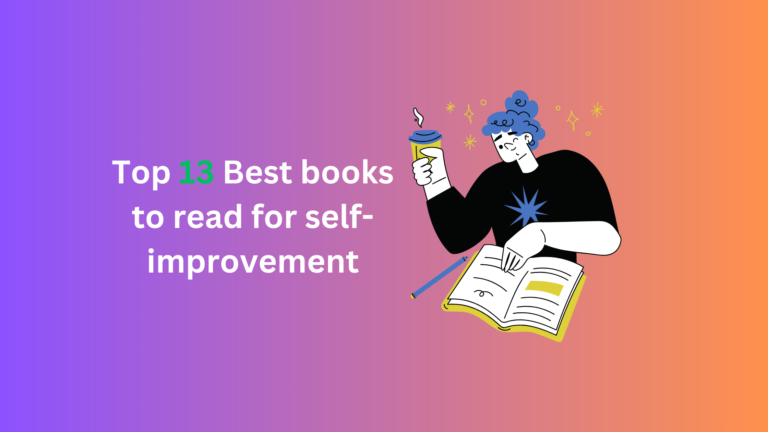Best Self-Improvement Books You Should Read in 2024
Best Self-Improvement Books, pointing people in the direction of personal development. As we go into the realm of the most fantastic self-help books,
we’ll examine these literary masterpieces’ profound influence and how they may spark life-changing shifts in various areas.
I. Overview A. The Influence of Best Self-Improvement Books

Written language has an unmatched power to mold our ideas and viewpoints. Learn how self-help books may use this power to improve change.
B. Getting Around the Huge Universe of Self-Improvement Literature
It might be difficult to choose the best self-improvement book from the many possibilities available. Discover how to maneuver over this varied textual terrain.
II. Comprehending Individual Development
A. The Self-Improvement Psychology
Transformation of Cognitive Behavior
Discover the nuances of cognitive-behavioral change and how it serves as the foundation for several methods of self-improvement.

The properties of neuroplasticity and its Function
Explore the idea of neuroplasticity and its tremendous effects on altering our brains for personal development.
B. Determining Your Personal Development Needs
The intelligence of emotions
Examine emotional intelligence’s role as a significant motivator for career and personal success.
Building Resilience Learn how to develop resilience, a crucial ability for overcoming obstacles in life.
III. Selection Criteria
A. Author Reputation and Skill
Well-known Thought Leaders
Consider the importance of choosing self-help books written by reputable thought leaders.
Various Viewpoints
Accept a variety of viewpoints by choosing books that provide a variety of opinions and strategies.
B. Realistic Relevance
Practical Techniques
The usefulness of self-improvement books should be assessed according to how well they provide doable tactics for everyday use.
Practical Takeaways
Learn the importance of actionable takeaways or concrete actions that readers may perform regularly.
IV. Everlasting Classics
A. Dale Carnegie’s “How to Win Friends and Influence People”
The Skill of Convincing
Examine Dale Carnegie’s timeless principles of persuasion.
Creating Lasting Connections
Learn the techniques from Carnegie’s classic to build enduring and meaningful connections.
B. Stephen R. Covey’s “The 7 Habits of Highly Effective People”
Changes in Paradigm
With the help of Covey’s seven habits, go on a voyage of paradigm changes and revolutionary thinking.
Setting Priorities for Achievement
Acquire the skill of prioritizing to lead a successful life personally and professionally.
V. Contemporary Marvels
A. James Clear’s “Atomic Habits”
Microscopic Modifications, Macroscopic Outcomes
Examine “atomic habits” and how little adjustments may significantly impact over time.
Techniques for Stacking Habits
Discover the effectiveness of habit stacking as a workable method for altering behavior.
B. Carol S. Dweck’s “Mindset: The New Psychology of Success”
Growth versus. Fixed Mindset
Explore Dweck’s research on growth and fixed mindsets and how they affect personal development.
Accepting Difficulties
Recognize the value of accepting obstacles to achieve achievement and personal development.
VI. Unusual Knowledge
A. Mark Manson’s “The Subtle Art of Not Giving a F*ck”
Incongruous Happiness
Examine Manson’s unique viewpoint and question accepted ideas of happiness.
Accepting the Unavoidable Challenges of Life
Accept that hardships in life are inevitable and discover how they may be an effective tool for personal development.
B. Dan Kahneman’s “Thinking, Fast and Slow”
Thinking in Two Systems
Examine Kahneman’s research on dual-system thinking and how it affects judgment.
Recognizing Cognitive Biases
Discover the unconscious prejudices that influence the way we think and make decisions.
VII. Getting Rid of Procrastination
A. Brian Tracy’s “Eat That Frog!”
Taking on Tasks of High Priority
Discover Tracy’s methods for taking on high-priority chores immediately to overcome procrastination.
Time Management Techniques To increase output and efficiency, learn practical time management techniques.
B. Steven Pressfield’s “The War of Art”
Recognizing Opposition
Recognize opposition and how it obstructs artistic pursuits.
Turning Pro in Creative Pursuits Learn how to overcome obstacles and take your creative endeavors to the next level.
VIII. Improving Emotional Capability
Daniel Goleman’s “Emotional Intelligence”
Acknowledging and Controlling Feelings
Discover Goleman’s strategies for identifying and controlling your emotions for success in your personal and professional life.
Development of Social Skills and Empathy
Recognize how social skill development and empathy contribute to the development of emotional intelligence.
B. Don Miguel Ruiz’s “The Four Agreements”
Individual Liberty via Contracts
Discover the four agreements that Ruiz put forward as a framework for personal liberation.
Maintaining Integrity in Daily Life
Examine the idea of leading an honest life and how it may profoundly affect human development.
IX. Fostering Adaptability
A. Sheryl Sandberg and Adam Grant’s “Option B”
Resilient Despite Adversity
Learn from Sandberg and Grant how to develop resilience and overcome hardship.
Creating Resilient Communities Recognize the value of creating supportive networks and resilient communities.
B. Ryan Holiday’s “The Obstacle Is the Way”
Using Stoic Philosophy to Overcome Difficulties
Examine how Holiday applies the stoic philosophy to overcome difficulties and setbacks.
Changing Obstacles into Opportunities
Discover how to turn obstacles into opportunities for both career and personal development.
X. Final Thoughts
A. The Always Changing Path of Self-Improvement
Consider the ever-changing terrain of personal development and the ongoing nature of the quest for self-improvement.
B. Ongoing Education and Utilization in Everyday Life
Stress the value of lifelong learning and the real-world implementation of self-improvement concepts.







